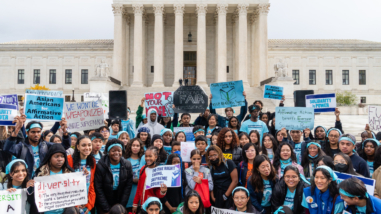Living into justice & equity — even when it gets difficult

Our Racial Justice strategy is anchored in a commitment to support racial justice organizations that work on the issue areas where Hewlett already engages. Since 2020, Hewlett has moved approximately $40 million in grants to racial justice organizations, and the Culture, Race, and Equity Program has funded 17 organizations. The grants we have provided aim to be, at minimum, for a three-year term and flexible, so racial justice organizations can direct funds to where and what they think is most essential.
In the first two years of the strategy, we have focused grantmaking in three areas. The first is field-building grants, which responds to chronic underinvestment of organizations that resource and build the racial justice field’s infrastructure. For example, this past year, we partnered with Borealis Philanthropy, which operates nine funds to advance racial, social, and disability justice. The second focus is on multi-issue grants, which brings the foundation into relationship with racial justice organizations that work on two or more of Hewlett’s existing grantmaking programs and initiatives. Here we’ve made grants to organizations like PolicyLink, whose work to create an equitable economy, an inclusive and compassionate society, and a strong, accountable democracy is connected to many areas where Hewlett already invests. Our third category is collaborative grants, which help Hewlett program teams bring new justice-focused grantees into their portfolio. In 2023, we proudly partnered with the Environment Program and Effective Philanthropy Group on grants to the Greenlining Institute and the Center for Evaluation Innovation, respectively.
Even though we are early in the strategy, we are already surfacing insights from grantees and the newly formed Racial Justice Advisory Council, which are helping to refine our approach.
- Flexibly funding racial justice organizations allows them to be adaptive. Our strategy was built with the recognition that funding to racial justice organizations often comes with many strings and in fits and starts. This cycle starves the organizations, limits their ability to be impactful, and prevents them from adapting their approaches as needed. Conversations with our grantees and advisory council have highlighted that long-term, flexible funding is the right approach, but they have also called on us to consider whether there is more we need to do in the wake of the Supreme Court’s affirmative action ruling. We are, therefore, exploring how we might augment our long-term grantmaking with funding to address the shift in the racial justice landscape.
- Convening can result in transformational change. We have learned that there is no better way to support communities than to be in community with those working to advance racial justice. We felt this repeatedly in 2023 as we met with grantees, partners, and our advisory council to deepen our relationships and have honest, direct conversations. We will seek to do more of it in the year ahead. This includes meeting with our Racial Justice Advisory Council several times throughout the year, attending and supporting grantee events across the nation, and hosting a grantee convening of our own.
- Shifting who we work with, and how we collaborate with them, matters. Hewlett is newer to the racial justice space, so it’s particularly important that we lean in as learners and operate in deference to those doing the work. It also requires that we break out of our own siloes, including within our own foundation, and grow our networks. As we do so, we must approach the collaboration with a spirit of reciprocity and respect — because how we work is as important as what we fund. This year, we hope to strengthen this muscle by building new relationships with those who push us to think differently and creatively about racial justice — and to provide support to organizations that have not been part of our network in the past.
We are excited to double down on advancing justice and equity; to share progress and challenges along the way; and, most importantly, to listen to those whose deep expertise is needed more than ever. Together — beginning within our four walls and continuing to the U.S. and beyond — we will work toward ensuring all people, no matter who they are or where they come from, can fulfill their own aspirations.



